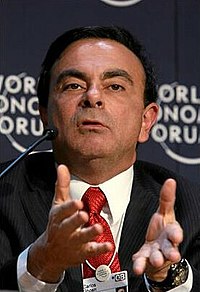Alliance with Renault

In 1999, with Nissan facing severe financial difficulties, Nissan entered an alliance with Renault S.A. of France.[12]
Signed on March 27, 1999, the Renault-Nissan Alliance is the first of its kind involving a Japanese and a French car manufacturer, each with its own distinct corporate culture and brand identity. The same year, Renault appointed its own Chief Operating Officer, Carlos Ghosn, as Chief Operating Officer of Nissan and took a 22.5% stake in Nissan Diesel. Later that year, Nissan fired its top Japanese executives.
The Renault-Nissan Alliance is a unique[citation needed] group of two global companies linked by cross-shareholding, with Renault holding 44.3% of Nissan shares, while Nissan holds 15% of (non-voting) Renault shares.
Under president Ghosn's "Nissan Revival Plan" (NRP), the company has rebounded in what many leading economists consider to be one of the most spectacular corporate turnarounds in history, catapulting Nissan to record profits and a dramatic revitalization of both its Nissan and Infiniti model line-ups. Despite the turnaround, Infiniti sales have been a disappointment. In 2001, the company initiated Nissan 180, capitalizing on the success of the NRP. The targets set with 180 were an additional sale of 1 million cars, achieving operating margins of 8%, and to have zero automotive debts. Ghosn has been recognized in Japan for the company's turnaround in the midst of an ailing Japanese economy. Ghosn and the Nissan turnaround were featured in Japanese manga and popular culture. His achievements in revitalizing Nissan were noted by Emperor Akihito, who awarded him the Japan Medal with Blue Ribbon in 2004.
The first product of the Nissan-Renault alliance was the Nissan Primera, launched in 2001 and based on the Renault Laguna that had been launched in 2000. Subsequently, Nissan's Micra, Note and Versa models have shared the same mechanical design as the Renault Clio.
Recent news
The Nissan Note, Micra and Qashqai in the UK are all produced at their UK factory in Washington, Sunderland. Nissan also produces cars at its factory at Roslyn, near Pretoria, South Africa.
In 2002, Toyota and Nissan agree to tie-up on hybrid technologies, and in 2004, Nissan unveiled the Altima hybrid prototype.
Nissan began development of fuel-cell vehicles (FCVs) in 1996 and launched limited lease sales of the X-Trail FCV in Japan in fiscal year 2003.
On May 17, 2006 Nissan released the Atlas 20 hybrid truck in Japan. It released a Cabstar hybrid truck at the 2006 Hannover Fair.
On June 30, 2006, General Motors convened an emergency board meeting to discuss a proposal by shareholder Kirk Kerkorian to form an alliance between GM and Renault-Nissan. On October 4, 2006, however, GM and Nissan terminated talks because of the chasm between the two companies related to compensation to GM from Nissan.
The company's head office is now in Tokyo but will move back to Yokohama in 2009.
Nissan North America relocated its headquarters from Gardena, California to Nashville, Tennessee in July 2006. A new headquarters, Nissan Americas, was dedicated on July 22, 2008, in the Cool Springs area of Franklin, Tennessee. Approximately 1500 employees work in the facility.
The Tamil Nadu state government signed a memorandum of understanding (MoU) with auto manufacturing consortium, Mahindra-Renault- Nissan to set up a production unit at Oragadam in suburban Chennai last week.
The consortium comprising Indian auto major Mahindra and Mahindra, Renault (France) and Nissan (Japan) will begin with an initial investment of Rs4000 crore to manufacture nearly 50,000 tractors every year other than cars, utility vehicles and spare parts.
The project is expected to increase Tamil Nadu’s Gross Domestic Product (GDP) by Rs18,000 crore annually while providing 41,000 jobs.
Environmental record
Until recently, Nissan Motors has had no special environmental record, at least as perceived relative to its competition. This may change in the future owing to a new emphasis on the development, production and marketing of electric automobiles. Nissan is planning to sell electric cars in California by 2010 (although only to fleet customers, a common method of introducing new technology). The company claims to have an EV model out that has a maximum speed of 75 mph (121 km/h) and can go 100 miles per charge. It is projected to take eight hours to fully charge the car. Nissan's car uses a lithium ion battery. The vehicle is intended for short distances, and is not meant for replacing traditional cars for long trips. In 2012, Nissan states that it will market electric cars for delivery in cities all over the world.[13] As with other electric cars these products from Nissan won't emit pollutants from their exhaust. Any pollution involved in their operation would come from the production of the electricity needed to charge the car, depending on the type of power generation facility.[14] Nissan has chosen to develop 100 percent electric cars rather than biofuel or ethanol running cars based upon cost analysis.[15]
No comments:
Post a Comment